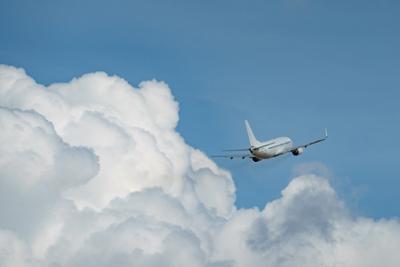

Increasing air traffic: Intermodal transport as a sustainable alternative

The revival of air traffic after the COVID-19 pandemic has been significant, driven by both tourism and business travel. However, air transport remains one of the main sources of CO2 emissions in the transport sector, underlining the urgency of seeking sustainable alternatives. Intermodality, which combines different means of transport to optimise efficiency and reduce environmental impact, emerges as a key solution to address this challenge. Global Mobility Call is holding a new edition of the international sustainable mobility event organised by IFEMA MADRID and Smobhub, from 19 to 21 November 2024.
Since the start of the pandemic, air traffic in Europe has shown a remarkable recovery. In 2023, the number of air passengers transported in the European Union reached 976 million, a year-on-year increase of 19%, according to Eurostat.
Air traffic in 2023 reached approximately 85% of 2019 levels, according to Eurocontrol, driven by an increase in tourism and business travel. In Spain, AENA reported that in 2023 Spanish airports managed over 250 million passengers, 90% of the traffic recorded in 2019. Aena estimates that by 2024 this number will leap above 300 million passengers, far exceeding the pre-pandemic volume.
Climate impact of air transport
Air transport is one of the most polluting means of transport, responsible for some 2.5% of global CO2 emissions. However, this figure is rapidly increasing, outpacing growth in rail, car, and maritime traffic. In the European Union, flights represent some 3.7% of total greenhouse gas emissions according to the European Environmental Agency.
The need to decarbonise air transport is crucial for fulfilling the climate targets set in the European Green Deal and the Paris Agreement, which aim to reduce emissions by at least 55% by 2030 compared to 1990 levels.
Intermodality as a sustainable solution
Intermodal transport offers a viable alternative to reduce dependence on air transport, combining different means of transport such as high-speed rail, electric buses and car sharing services. This strategy not only reduces CO2 emissions, but also improves transport efficiency and convenience.
Countries such as France and Germany are leading the way in the adoption of intermodal solutions. In France, a ban on domestic flights has been implemented on routes where the train journey takes less than 2.5 hours. This has encouraged the use of trains, a more sustainable option.
In Germany, the integration of rail and air services, such as the Lufthansa Express Rail programme, allows passengers to combine rail and air tickets in a single booking, reducing the need for short flights.
Challenges and opportunities
Despite progress, the implementation of intermodal solutions faces several challenges. The lack of an adequate infrastructure, the need for coordination between different transport operators, and the reluctance of consumers to change their travel habits are significant obstacles. However, these challenges also represent opportunities to innovate and develop new technologies and policies that promote sustainability.
Global Mobility Call, to be held at IFEMA MADRID from 19-21 November 2024, will address these challenges and explore innovative solutions to accelerate the transition to more sustainable transport. This event will bring together industry experts, policy makers and other key stakeholders to discuss and share best practices in transport intermodality and decarbonisation.
In conclusion, intermodality emerges as a promising alternative to reduce the environmental impact of air transport in Europe. Combining different modes of transport can not only reduce CO2 emissions, but also improve the efficiency and convenience of the transport system, thus contributing to the decarbonisation and sustainability goals set by the European Union.





